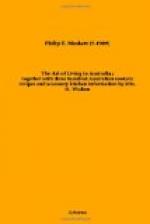* 1/2 lb. Rice—1d. * * 2 oz. Butter—2d. * * 1 gill Milk—1/2d. * * Salt * * 2 Eggs * * 1 Carrot * * 1 Onion—2 1/2d. * * Total Cost—6d. * * Time—Half an Hour * Wash the rice well in two waters, put into a saucepan with 2 1/2 pints of cold water and the onion and carrot whole. As the rice begins to swell add some more boiling water, until it is about the right consistency. Take out the onion and carrot and stir in the butter, a small piece at a time. Beat the yolks of the eggs in a basin, stir them quickly in, and bring again to boiling point, but do not let it boil; season with salt, and serve at once, with tiny rusks of bread. Make these by cutting up a dry crust into small pieces, dipping them in water, and baking until crisp in a moderate oven.
ARTICHOKE SOUP
* 2 lbs. Artichokes—3d. * * 2 Onions—1/2d. * * 1 1/2 pints Milk—4d. * * 2 quarts Bone Stock (White) * * 1 tablespoonful Vinegar * * 1 tablespoonful Lemon Juice * * 1 doz. White Peppercorns—1d. * * Total Cost—8 1/2 d * * Time—One Hour and a Quarter. * Peel the artichokes and lay them in vinegar and water for an hour; this will make them a good colour. Mix up half a pint of the milk with the stock, and boil the artichokes, onions, and peppercorns in this for an hour. Rub through a hair sieve with a wooden spoon. Stir in the milk and some salt, pour back into the saucepan and stir until it boils. If the artichokes do not thicken the soup sufficiently, sprinkle in a little sago or semolina when it is returned to the saucepan. Serve with fried bread.
CHAPTER XVIII.
FIFTY RECIPES FOR FISH.
The consumption of fish as a daily article of food is not nearly so large as it ought to be if we studied our health. It must be admitted that it is much more expensive than meat, and cannot be bought so readily. Then again, ordinary plain cooks only know how to fry and boil it, so that very little variety can be obtained; and even these two methods are often so badly followed as to take away rather than tempt the appetite. Not one cook in a hundred knows how to boil fish properly. If a little more time and attention were given to fish-cooking we should not have so many complaints, and fish, instead of being a neglected food, would be a much desired one. It has one or two advantages over meat. It is easier of digestion, for one thing. It is therefore an invaluable food for people obliged to be indoors a great deal, or for those engaged in literary work, for it contains, besides other good things, a good proportion of phosphorus, and this is excellent food for the brain and organs of the chest. It is, however, with the cooking of fish that we have to deal. In the first place, be sure that it is perfectly fresh. The flesh should be firm and hard; if soft and leaving the mark of the finger if pressed, it must be rejected. It must also smell




